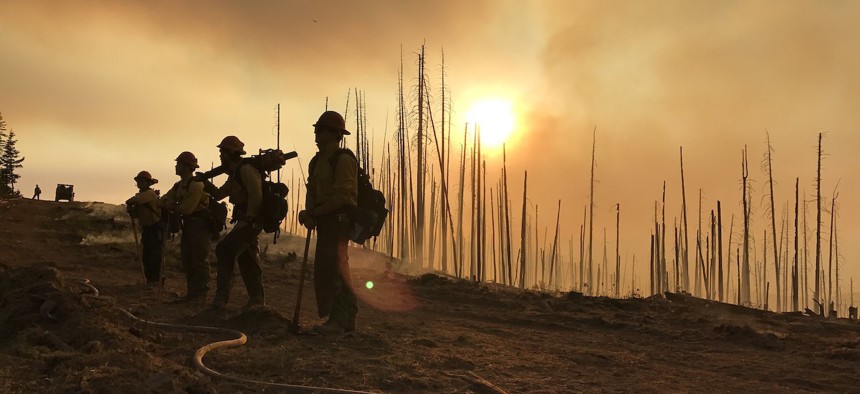
The Bureau of Land Management's Gila District's Safford Hand Crew works a burnout operation during the 2017 Frye Fire in Coronado National Forest in Arizona. Bureau of Land Management
The 'Pay Cliff' That Could Cripple the Federal Government's Firefighting Workforce
A federal employee union said Wednesday that without a permanent boost to federal wildland firefighters’ pay and benefits, agencies will see a “mass exodus.”
A bipartisan group of senators this week urged their colleagues to move quickly to advance legislation that would permanently boost the pay of federal wildland firefighters, as labor organizations warn of a looming “mass exodus” of the first responders when temporary raises expire this fall.
Last month, Democrats in both the House and Senate reintroduced the Tim Hart Wildland Firefighter Classification and Pay Parity Act (H.R. 3108). The bill would set new special pay rates for federal wildland firefighters to ensure they make at least $20 per hour and would establish a new form of overtime pay—incident standby premium pay—to compensate firefighters for all hours they are mobilized to respond to a fire incident.
The measure also would grant paid leave for rest and recuperation following a firefighter’s deployment to combat wildfires, seven days of mental health leave per year, as well as create a database to track chronic diseases caused by on-the-job exposure to environmental toxins. And it would allow firefighters to credit years of service under temporary appointments toward their retirement benefits, as well as include premium pay in the calculation of their defined benefit annuity.
The legislation comes on the heels of a number of piecemeal efforts to improve federal firefighter compensation, including a series of bonuses and cash awards issued by President Biden to ensure they make $15 per hour and raises of up to $20,000 as authorized by the bipartisan infrastructure law. But those pay increases are only temporary.
In a letter to the leadership of the Senate Homeland Security and Governmental Affairs Committee Monday, a bipartisan group of 12 senators, led by Tim’s Act lead sponsor Sen. Michael Bennet, D-Colo., urged their colleagues to provide “swift consideration” of the bill, noting the temporary pay raises will expire on Sept. 30.
“Wildland firefighters are on the front lines, protecting homes and communities, and helping reduce megafires’ severity and scope,” the senators wrote. “Despite their critical importance, federal wildland firefighters are stretched to their breaking point. They are working increasingly long fire seasons under extreme conditions. A recent Government Accountability Office report found that low pay, poor work-life balance and mental health challenges, among other factors, limit federal wildland firefighter recruitment and retention.”
In the wake of the letter, and as much of the east coast is under a haze of smoke from a Canadian wildfire, the National Federation of Federal Employees, a union that represents around 10,000 federal wildland firefighters, issued a stark warning: without a quick—and permanent—boost to compensation and benefits, federal agencies that employ the first responders could see “mass resignations.”
“Federal wildland firefighters have made it clear that they will leave the workforce if they are not paid what they deserve,” said NFFE National President Randy Erwin. “These brave men and women risk their lives to protect our public lands and communities during wildfires and other national emergencies, but Congress has yet to give them a permanent living wage. Even when the temporary pay increase provided by the [bipartisan infrastructure law], federal land management agencies are struggling to retain and recruit qualified individuals. When the [law’s] supplemental funding runs out, the workforce will see a mass exodus.”
Erwin said that without congressional action, the “pay cliff” looming over the federal firefighting workforce later this year could cripple the government’s ability to combat wildfires.
“As it stands, employees will see their base income cut by 50%, up to $20,000,” he said. “Many wildland firefighters will feel they have no choice but to take jobs with state and local fire departments. Congress must fix the pay cliff now before things get worse, and separately we can continue to explore badly needed programmatic improvements to working conditions, mental and physical wellness, career opportunities and more.”







